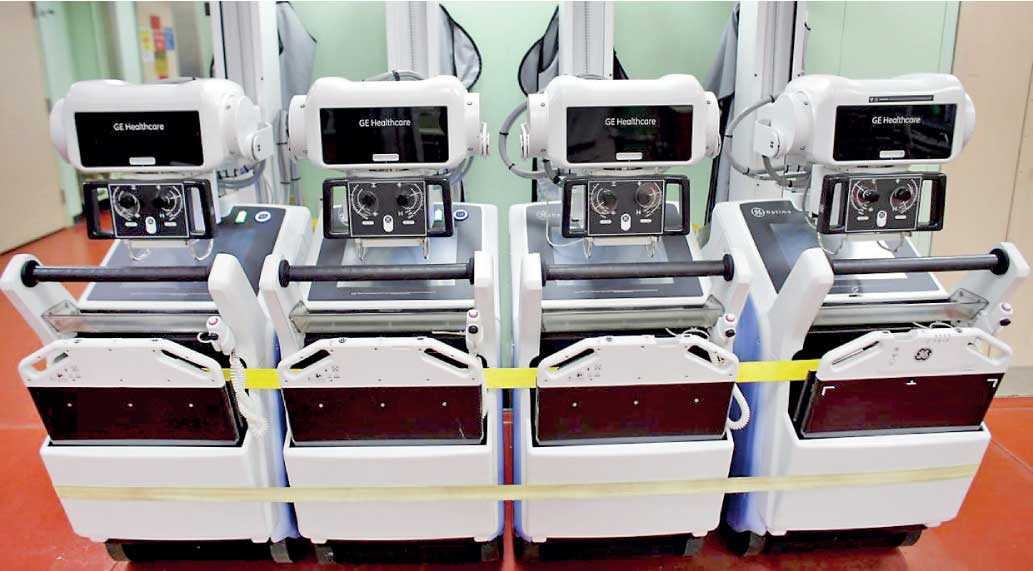Monday Feb 23, 2026
Monday Feb 23, 2026
Friday, 29 June 2018 00:00 - - {{hitsCtrl.values.hits}}

FILE PHOTO: Portable X-ray machines made by GE Healthcare are shown on board the hospital ship USNS Mercy (T-AH 19) prior to its departure from Naval Base San Diego on a four month Pacific Partnership humanitarian deployment to the South Pacific-REUTERS
Reuters: General Electric Co. said on Tuesday it will spin off its healthcare business and divest its stake in oil-services firm Baker Hughes, effectively breaking up the 126-year-old conglomerate which was once the most valuable US corporation and a global symbol of American business power.
The slimmed-down company will focus on jet engines, power plants and renewable energy, which GE hopes will reward battered shareholders who have seen the stock lose more than half its value over the past 20 years.
“This is really the culmination of 10 years of observations I’ve had about the company,” said Chief Executive Officer John Flannery, a GE veteran who took the helm in August with a mandate to revamp the company. “It’s a dramatic, sweeping change.” Flannery’s comments came on a conference call with investors and analysts.
GE said its plan will strengthen its balance sheet by reducing debt, building up cash and further shrinking GE Capital. Shareholders will receive 80% of the value of GE Healthcare as a tax-free distribution of shares.
GE shares jumped nearly 7% to $13.63 and were on track for their best day in three years.
Effective Tuesday, GE was booted from the Dow Jones industrial average, the iconic stock index of which it was a founding member in 1896.
The company will spin off the profitable healthcare unit over the next 12 to 18 months, and sell its Baker Hughes stake over two to three years.
GE pledged to preserve its 48-cent-a-year dividend until the healthcare unit is spun off, partially appeasing investors who have expressed concerns about GE’s ability to pay it.
The moves, which end a year-long strategic review, mirror changes that analysts had sought a year ago.
With the latest moves, GE said its plan to divest $20 billion in assets “is substantially complete,” leaving a “simpler and stronger” company that it hopes will boost growth, operating profits and shareholder returns.
“We are aggressively driving forward as an aviation, power and renewable energy company - three highly complementary businesses poised for future growth,” Chief Executive Officer John Flannery said in a statement.
The remaining businesses “share similar technologies and industrial markets, in contrast to limited synergies that exist with GE Healthcare,” Fitch Analyst Eric Ause said in a note.
The changes leave GE with some of its best- and worst-performing units. Aviation has been highly profitable, but the power business profit has tumbled as sales of plants and services have slowed, and renewable energy profit margins are in the single digits.
The healthcare unit spinoff follows rival Siemens AG, which floated its medical business as a separate company, Siemens Healthineers, in March.
GE has faced tough competition for medical imaging machines, which include MRI scanners and ultrasound devices, from rivals Philips and Siemens as well as Asian upstarts.
On Monday GE said it agreed to sell its distributed power unit for $3.25 billion to US buyout group Advent. GE also has agreed to shed its transportation unit, which makes railroad locomotives.
GE bought Baker Hughes in July 2017 and combined it with the GE oil and gas equipment and services operations to create a new company in which GE holds a 62.5% stake. The unit reported sales of $17.23 billion in 2017.
GE estimated restructuring costs at between $800 million and $1.2 billion, and said it plans to reduce industrial net debt by about $25 billion by 2020 and maintain more than $15 billion of cash on its balance sheet.
The company has foundered in several key industrial markets in recent years, and a foray into financial services steered it into the eye of the global financial crisis in 2008.
GE has since largely divested GE Capital, but lingering liabilities forced it to take a $6.2 billion charge last year, and begin setting aside $15 billion more in reserves against insurance claims.